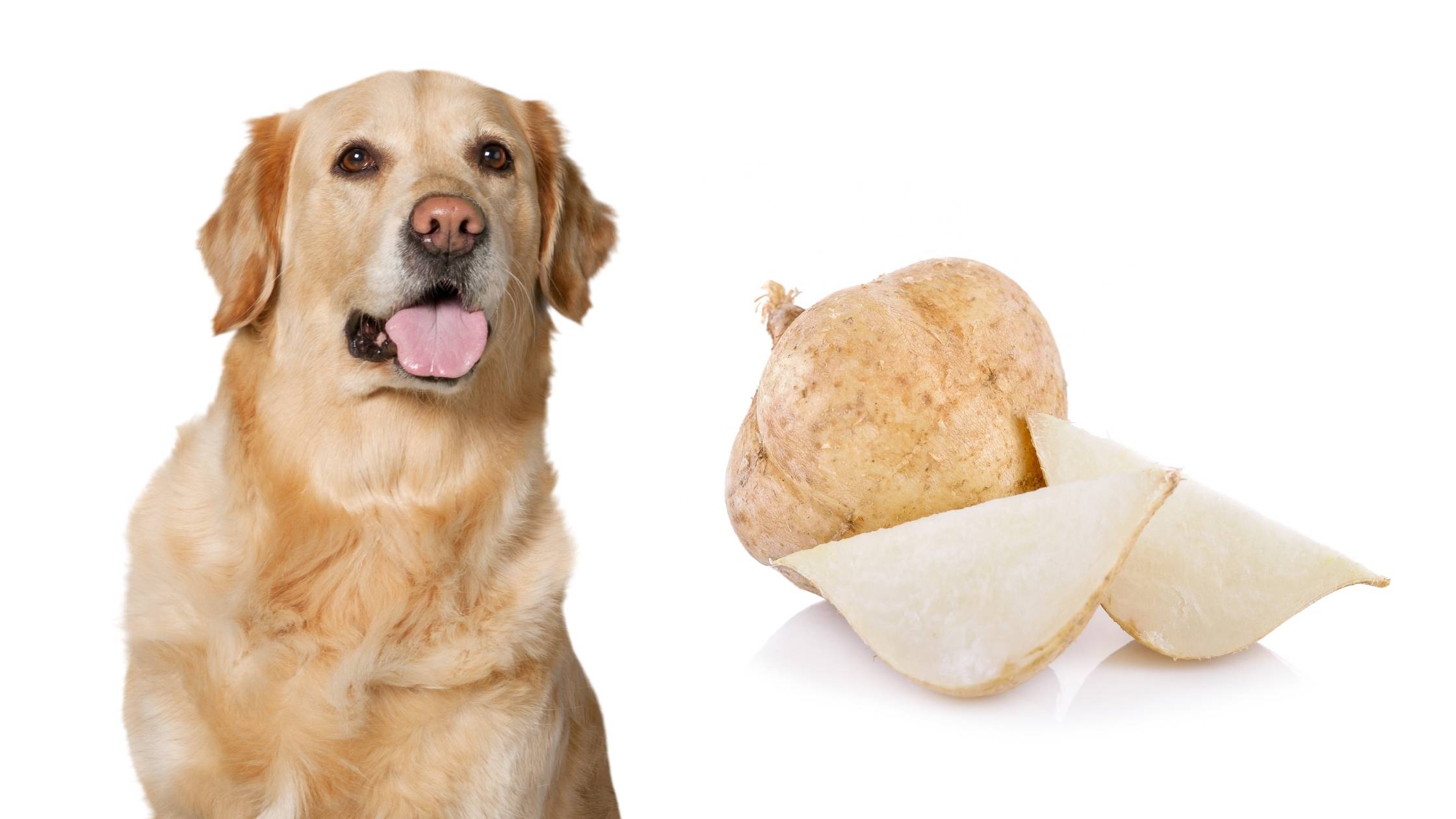Last Updated on 11/25/2021 by Veronica Jones
If you love to add jicama sticks to your potato salad or stir fry, you may be wondering if it’s safe for doggy consumption.
As dog owners, we know that our four-legged friends will eat anything you put in front of them, including things that could harm them.
So, can dogs eat jicama? This article will tell you everything you need to know about dogs and jicama.
What is jicama?
Jicama is a root vegetable, often referred to as the Mexican potato, that belongs to the bean family. It has a rough skin that should be removed before eating. The flesh contains lots of nutritional vitamins and minerals and makes a good addition to a healthy, balanced diet. Jicama tastes like a juicier, sweeter version of a potato and is often used in fruit or vegetable salads to give texture.
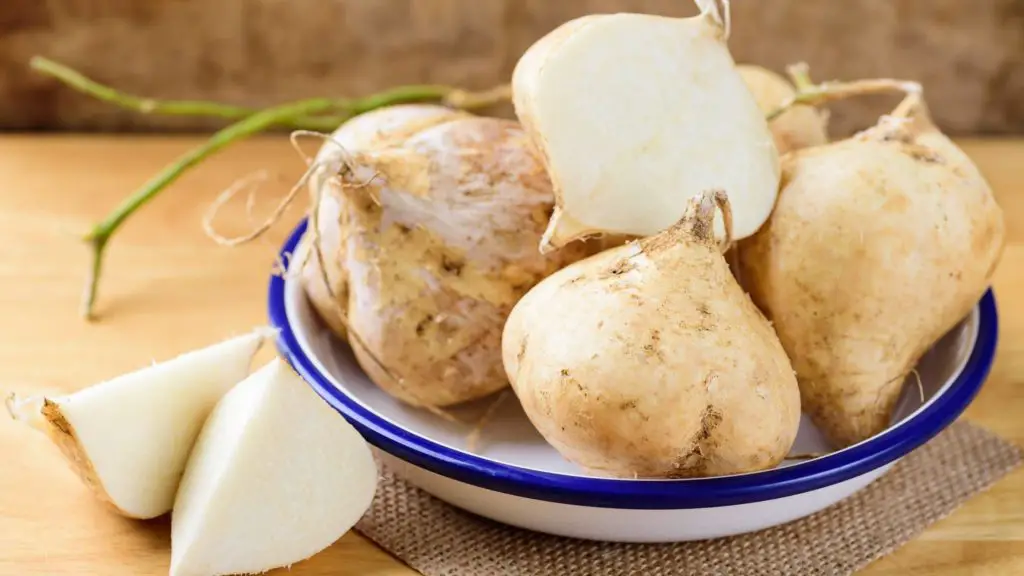
Can dogs eat jicama?
Yes, canines can safely eat the root of a jicama plant. However, the rest of the plant including the skin, leaves, stem, pod and seeds should not be consumed because they are poisonous.
Can dogs eat raw jicama?
As long as the skin that contains the toxic chemical has been removed, dogs can safely eat raw jicama. Pet parents need to be aware though that this uncooked root vegetable may be hard for some canines to digest properly. Undigested food can cause tummy pain and gastrointestinal upset in dogs. Cooking jicama is a better option, especially when consuming it for the first time.
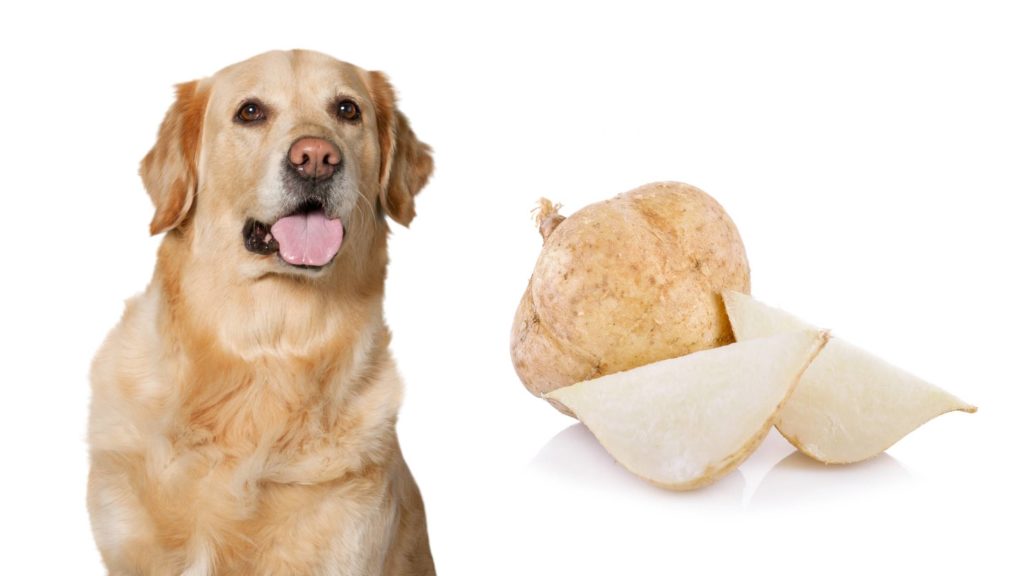
Can dogs eat jicama leaves?
No, dogs should not eat jicama leaves because they contain a toxic chemical called rotenone. Rotenone is highly poisonous to both humans and dogs and should be kept well out of reach.
Can dogs eat jicama plants?
No, jicama plants are toxic to dogs. The only part of a jicama that is safe for doggy consumption is the flesh. Every other part should be removed and discarded of.
What are the health benefits of dogs eating jicama?
Boosts cardiovascular health
The nutrients found in jicamas can improve your pet’s heart health. The potassium found in jicama has been proven to relax a dog’s blood vessels and lower blood pressure. The fibre in jicama reduces cholesterol levels and maintains a regular, healthy heartbeat.
High levels of potassium
Potassium is vital to your pooch’s heart health because it regulates the heartbeat, and lowers cholesterol. Hypokalemia is a condition where a dog’s potassium levels are low, affecting the functioning of the heart, nerves and muscles. If your dog shows signs of lack of appetite, muscle pain, loss of muscle mass, paralysis of the muscles, vomiting or lethargy, speak to your vet immediately.
A good source of inulin
Inulin plays a crucial part in maintaining a healthy digestive tract in dogs. It is usually added to your dog’s food to aid digestion and replace fat in food. Jicamas will provide your pup with good bacteria in his gut and improve overall health, wellbeing and mood.
Weight loss
If you’re looking for a low calorie, healthy snack for your pooch, jicama ticks those boxes. Serving your pet jicama will help him lose weight whilst ensuring he remains satisfied and full of energy.
Boosts your dog’s immune system
Vitamin C found in jicama can help to strengthen your canine’s immune system, contributing to good overall health and reducing the risk of infections, diabetes and some types of cancer.
A good source of fibre
Fibre ferments into fatty acids which then helps to prevent bad bacteria from growing in a dog’s stomach. Fibre can also help to reduce the risk of colon cancer in dogs. A dietary fibre found in jicama can bulk up stools, making it a good, natural treatment option for canines that are suffering from diarrhea. However, too much fibre can cause diarrhea and gastrointestinal upset in canines, so it’s important to get the balance right.
Maintains strong bones
Jicama is bursting with calcium and magnesium which are essential minerals needed for developing strong and healthy bones in canines.
Keeps teeth clean
Jicama is a crunchy, fibrous vegetable that can help clean a dog’s teeth when they munch on it. It’s also known to help prevent bad breath.
Helps prevent ageing
Vitamin C and other antioxidants in Jicama has been proven to fight against free radicals and help prevent degeneration.
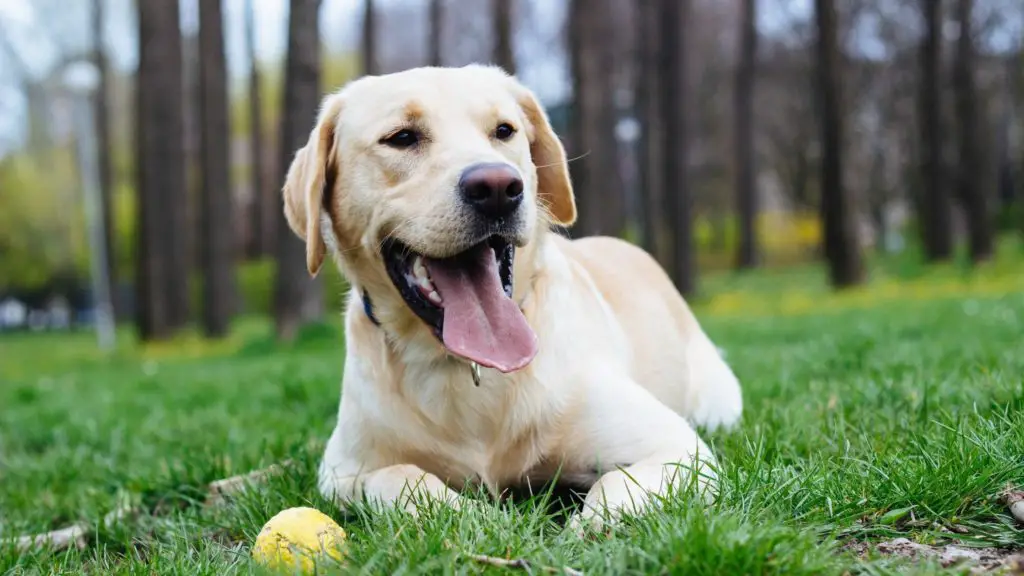
Is jicama poisonous to dogs?
Apart from the flesh, all other parts of the jicama plant are extremely poisonous. Jicama is only available in stores without the toxic parts attached, which means the only way your pup could be at risk is if you grow jicama plants in your house.
Rotenone poisoning: If your dog gets hold of an unpeeled jicama or any other part of the plant, he could experience rotenone poisoning. Symptoms include:
• Vomiting
• Diarrhea
• Drooling
• Difficulty breathing
• Less frequent or more frequent urination
• Depression
• Muscle tremors
Inducing vomiting, administering activated charcoal, prescribing medications and hospitalization are all treatment options that your vet will consider.

Other risks to feeding jicama to your pup
Food allergies: it is possible that your dog could experience an allergic reaction to jicama. Vomiting, diarrhea, skin irritation and rashes are all common signs of a food allergy. If your pup shows any of these signs, avoid giving him any more jicama and speak to your veterinarian if you’re concerned.
Added seasoning: humans often add salt and chilli powder to jicama to add flavour. It’s important not to share seasoned jicama with your pup because these added ingredients could make your pet very sick. Whilst chilli powder is not toxic to canines, most pups don’t like spice and it can upset a dog’s digestive system and cause diarrhea. If a dog has too much salt in their diet, it can lead to sodium poisoning which is extremely dangerous and should be treated as a medical emergency.
Symptoms of salt poisoning in dogs include:
- Stomach pains
- Loss of appetite
- Swollen tongue
- Vomiting
- Diarrhea
- Convulsions
- Extreme thirst and urination
- Muscle spasms
- Loss of energy and appetite
- Difficulty breathing
Speak to your vet immediately if you think your pup has consumed jicama with lots of salt and is showing signs of salt poisoning.
What to do if your pooch eats a jicama plant?
You should contact your veterinarian immediately if your pet has eaten any part of a jicama other than the flesh. Remove any remaining parts of the jicama plant to prevent your pet from eating any more and causing further harm. It’s unlikely that the jicama plant contains enough rotenone to be fatal to your four-legged friend, however it will still cause them to be sick and they will need medical attention.
If your pup eats too much jicama flesh, he may experience stomach upset. You should consult your vet who can prescribe medication to soothe your pet’s discomfort and prevent dehydration.
How to serve jicama to your pup safely?
Can dogs eat fresh jicama? The best way to give your dog jicama for the first time is to cook it by either boiling or baking it in the oven. First, wash the vegetable thoroughly and peel the skin off. Next, deseed and destem the jicama to make sure you have removed all of the poisonous parts of the plant.
Dice up the root vegetable into small, bite-sized pieces and either place them in a pan of boiling water until soft or sprinkle with a tiny amount of olive oil and bake on a baking tray for around an hour until cooked through.
Once cooled, remember not to add any seasoning to the jicama that you’re serving to your dog. Alternatively, mash up the cooked jicama and mix it with your dog’s usual food.
Raw jicamas can be chopped up and given to pups, but sometimes the rough texture may be hard for them to digest.
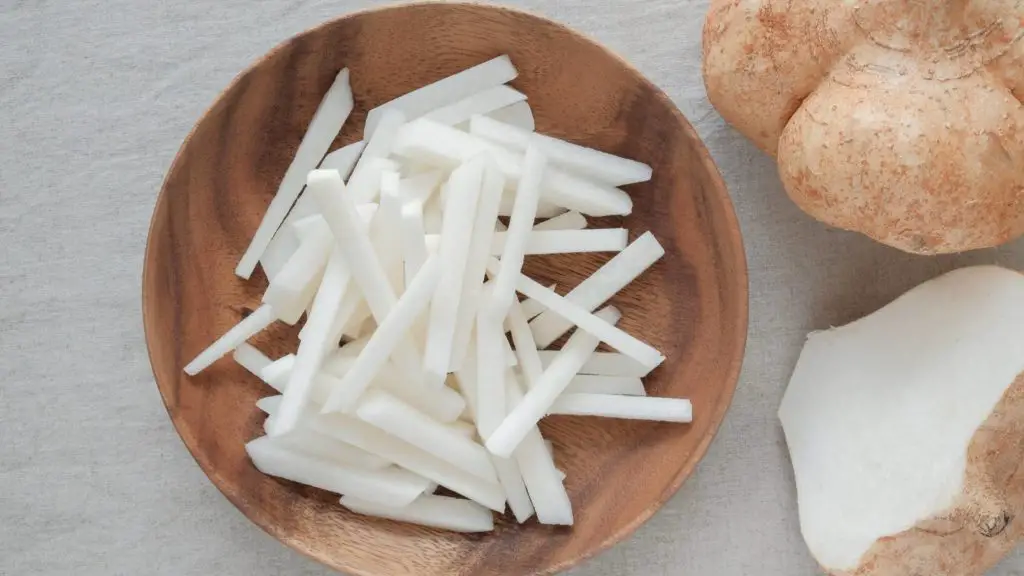
How much jicama should a dog eat?
Jicama should not be a substitute or replacement to your pet’s usual dog food. When giving your pup new foods it’s always best to do so in small amounts and monitor their reaction closely. Even though this root vegetable can benefit your dog’s health, it’s best to only give it occasionally as a healthy snack or treat.
What other root vegetables are safe for dogs and which ones should be avoided?
Do you know which ones are safe for doggy consumption?
Not safe:
Onions and garlic – These common store cupboard essentials belong to the Allium family of herbs, which are highly toxic to dogs. Excessive salivation, mouth irritation, vomiting and diarrhea may be early signs of toxicity in dogs. The most dangerous part of these herbs can damage your pup’s red blood cells, preventing oxygen from being carried around his body. A rapid heart rate, panting, weakness and discoloured urine are all signs that your dog has eaten something he shouldn’t and an emergency trip to the vet is required.
Safe:
Carrots – all parts of a carrot are safe for dogs to munch on. Carrots can even slow down the progression of dental disease by helping to keep your pooch’s teeth clean. Carrots are low in fat, making them a healthy snack choice for overweight dogs. The fibre levels will also help to keep your pet’s bowel movements regular.
Sweet potato – Sweet potatoes are an excellent source of fibre for dogs and are a great way to help aid digestion. Make sure you cook the potato well and remove the skin before serving to your canine so it’s easier to digest. The antioxidants found in sweet potatoes are a good way to support healthy gut bacteria and lower the chances of your dog getting gastrointestinal upset. Beta-carotene has even been proven to support eye health in canines and reduce the risk of diseases such as cancer. This superfood only contains a small amount of fat, making them a healthy choice of snack for dogs.
It’s recommended that you limit the amount of starchy, high in sugar vegetables that your canine consumes. Vegetables should not replace your dog’s usual diet but can add extra nutrients if eaten in moderation.
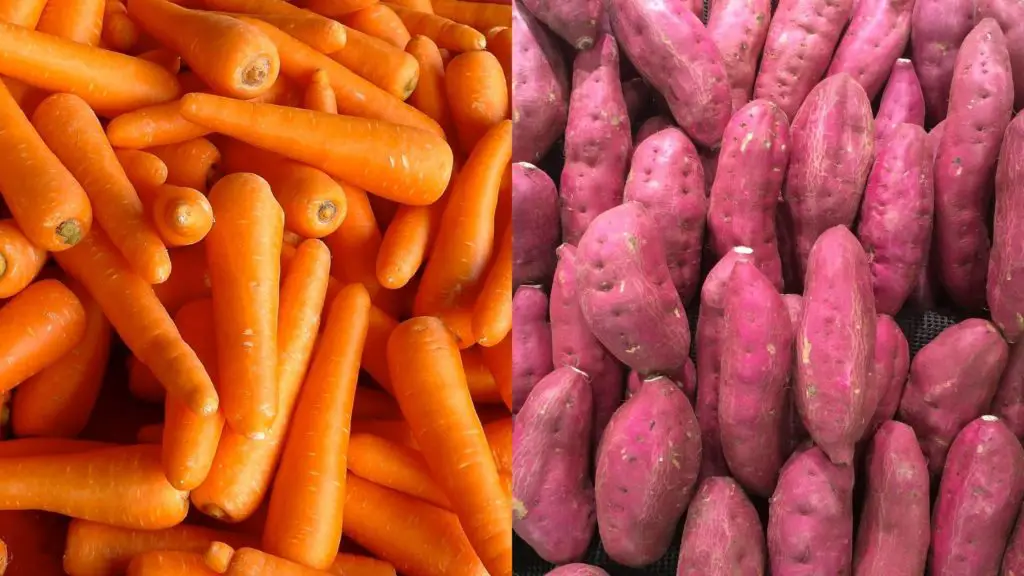
Dogs and jicama
As long as you prepare the jicama correctly and remove the poisonous parts of the root vegetable, dogs can safely snack on jicama in moderation. As with all human foods, contact your vet if you witness your dog having a reaction or acting out of character after eating jicama for the first time.
Looking for More Great Articles About What Your Dog Can (or Can’t) Eat?
- Can Dogs Eat Acai (Berries or Bowls)? Is it Safe?
- Can Dogs Eat Pomelo Fruit?
- What Fruits and Vegetables Can Dogs Eat? A Complete List
- Can Dogs Have Water Chestnuts?
- Can Dogs Eat Dragon Fruit? Everything You Need to Know
Reference list
- Pet MD “low potassium in dogs” https://www.petmd.com/dog/conditions/endocrine/c_dg_low_potassium Accessed 20th November 2021
- VCA Hospital “garlic poisoning in dogs” https://vcahospitals.com/know-your-pet/onion-garlic-chive-and-leek-toxicity-in-dogs Accessed 20th November 2021
- Pet poison helpline “salt poisoning in dogs” https://www.petpoisonhelpline.com/poison/salt/ Accessed 20th November 2021
- AKC “what human foods can dogs eat” https://www.akc.org/expert-advice/nutrition/human-foods-dogs-can-and-cant-eat/ Accessed 20th November 2021

